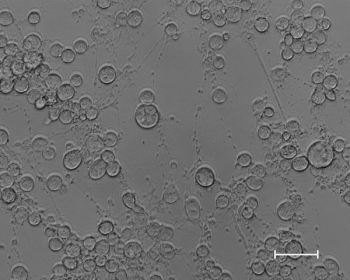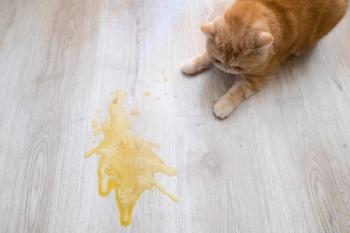
Pets and Vets: Cornell veterinarians treat pig for lymphoma
Cornell treats 730-pound Hampshire pig for lymphoma-a first in large animal veterinary treatment.
Cornell University Hospital for Animals' 730-pound patient is believed to be the first pig to be treated for lymphoma, according to the college. Nemo, a 4-year-old rescued black-and-white Hampshire pig, was diagnosed with presumptive B-cell lymphoma and treated with intravenous medication delivery.
Surgeon Jim Flanders, DVM, DACVS, who had performed similar procedures in smaller animals, partnered with large animal surgeon Susan Fubini, DVM, DACVS, to surgically implant a vascular access port in Nemo. According to Cornell, the doctors decided to run a catheter up a vein in Nemo's neck to a port behind his ear, creating a route for delivering drugs where they would be most effective while minimizing harm. "We adapted a treatment plan based on what we know is effective in dogs, cats and humans with lymphoma," Cornell hospital oncologist Cheryl Balkman, DVM, Dip. ACVIM, says in a release.
Nemo, a 4-year-old Hampshire pig, was administered chemotherapy at Cornell Univeristy Hospital for Animals after being diagnosed with lymphoma. He is the first known large animal to receive the treatment. Nemo is doing well as a full-time resident at the teaching hospital. (PHOTO COURTESY OF CORNELL UNIVERSITY)
The college says Nemo's clinical signs have resolved and he continues to do well during long-term treatment. Nemo, who arrived at Cornell's hospital in March, is now a distinguished full-time resident, providing valuable information to veterinarians as the first pig treated for lymphoma.
"He has a better life there," says Nemo's owner, George Goldner. "He's running around digging holes, eating pineapples, communicating vocally and getting lots of love. Cornell Hospital for Animals people play with him and bring him treats, and he plays funny tricks like tossing water at the residents. The vets have cared for him with amazing dedication and thoughtfulness."
California
Nearly 100 poisoned meatballs left on the streets across six San Francisco neighborhoods have claimed the life of one dog and sickened others. The tainted meatballs, apparently left in areas where dogs frequent, contained high levels of strychnine. Local police claim the meatballs contained enough strychnine to kill a human. There are no suspects, but a reward for identification has been established.
Colorado
A rabid kitten bit three adults and five children in Larimer County, Colo., including a veterinarian who examined the kitten. The kitten, born to an unvaccinated barn cat, was euthanized and sent to the Colorado State University Veterinary Diagnostic Lab where rabies was confirmed. Reports of rabies cases have been high in Larimer County—specifically in skunks. Of the cases recorded so far this year, 28 involved skunks, in addition to five bats, four raccoons, three foxes and the one cat, according to the county website. There have also been four livestock deaths to rabies in neighboring Weld County—three horses and one bull. County officials say the number of rabid animals in the area has risen steadily since 2012 and advises residents to keep their pets up to date with vaccinations.
Florida
The University of Florida's College of Veterinary Medicine and the Maples Center for Forensic Medicine in partnership with the American Society for the Prevention of Cruelty to Animals awarded its first Veterinary Forensic Sciences Graduate Certificates to members of the spring class of 2013. The graduate certificate is offered solely online and covers topics such as crime scene processing, scientific and legal principles of forensic evidence, animal cruelty and interpersonal violence, and forensic pathology and entomology.
Missouri
Clark Fobian, DVM, of Sedalia, Mo., recently began his term as president of the American Veterinary Medical Association (AVMA). Fobian has served in many positions within the Missouri Veterinary Medical Association and the AVMA. He owns a small animal practice in Sedalia he opened in 1981, where he continues to practice.
Dr. Clark Fobian
Montana
Ten Montana State University students will be chosen for the new Montana Cooperative Veterinary Medicine Program through Washington State University's (WSU's) College of Veterinary Medicine. The students will spend the first year of the program at Montana State with the remaining years at the WSU veterinary school. Students may apply through Oct. 2 for the 2014 fall semester. The program's admissions committee is seeking students with strong ties to Montana who want to work in food animal medicine and other areas of emphasis across the veterinary profession.
Pennsylvania
Radnor Township, a suburb of Philadelphia, has proposed an ordinance making anyone who feeds a stray animal on a regular basis responsible for vaccinating it for rabies and obtaining any required state license. The ordinance positions those feeding feral cats or stray dogs as taking ownership of the animals, therefore making them subject to fines of up to $1,000 a day if legal requirements of ownership are not met.
Texas
The Texas A&M College of Veterinary Medicine and Biomedical Sciences broke ground on a $2.8 million aviary funded with university support and private donations. The approximately 11,000-square-foot Exotic and Wild Bird Aviary will house a hospital, receiving area with quarantine capabilities, two isolation rooms, a biosafety level 2 laboratory for infectious disease research, teaching and classroom space, and offices. The aviary is scheduled for completion in May 2014.
Newsletter
From exam room tips to practice management insights, get trusted veterinary news delivered straight to your inbox—subscribe to dvm360.





